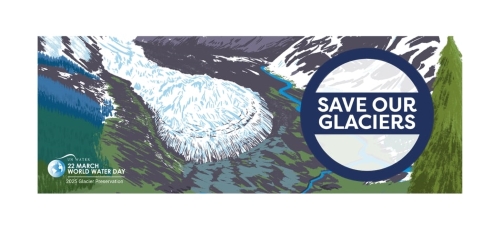World Water Day is observed annually on 22 March to highlight the importance of freshwater and advocate for the sustainable management of water resources. Established by the United Nations (UN) in 1993, this global event aims to raise awareness and inspire actions to tackle the water crisis worldwide. The celebration is closely linked to Sustainable Development Goal (SDG) 6, which aims to ensure water and sanitation for all by 2030.
World Water Day 2025 Theme
The theme of World Water Day 2025 is 'Glacier Preservation', emphasising the critical role of glaciers in maintaining global freshwater supplies and the urgent need for conservation measures in the face of climate change.

Source:iwmi.org
What is World Water Day?
World Water Day was established in 1992 when the United Nations convened the Conference on Environment and Development in Rio de Janeiro, Brazil. During this conference, a resolution was passed, officially designating March 22 as World Water Day. The first observance took place on March 22, 1993, marking the beginning of an annual global initiative.
The primary goal of World Water Day is to recognise the significance of water on our planet. Beyond celebration, it serves as a platform to highlight the severe water crisis affecting millions worldwide. Currently, around 2.2 billion people lack access to clean and safe drinking water. Each year, a specific theme is chosen to draw attention to critical water-related challenges and encourage collective action.
Also Read| International Day of Forest 2025: Theme and Significance
Also Read| International Day of Forest 2025: What is India's Role in the Conservation of Forest?
How is World Water Day observed?
In the days leading up to March 22, individuals, communities, and organisations work to promote awareness about the importance of water and the urgent need for equitable access to it. Various events, educational campaigns, and social media initiatives help spread the message. The United Nations-Water also leads a global campaign through its official website, www.worldwaterday.org, encouraging worldwide participation.
On the day itself, the United Nations publishes its World Water Development Report, aligning with the chosen theme for that year. This report not only provides insights into the state of global water resources but also offers policy recommendations aimed at helping governments and decision-makers implement sustainable water management strategies.
World Water Day is a call to action, reminding us of our shared responsibility to protect and conserve one of Earth’s most vital resources—water.
What is the significance of World Water Day?
World Water Day is celebrated to encourage awareness of water scarcity and safe drinking water. Below is given all its significance in detail:
- Raises awareness of 2.2 billion people living without access to safe drinking water.
- Encourages global action to address water scarcity and contamination issues.
- Supports Sustainable Development Goal 6 (SDG 6): Water and sanitation for all by 2030.
- Highlights the threats to water resources from climate change, population growth, and industrial demands.
Why Glacier Preservation Matters?
Glaciers are crucial for the planet, providing essential freshwater for various needs, including:
- Drinking water
- Agriculture
- Industry
- Hydropower generation
- Ecosystem stability
However, rapid glacier melting due to climate change is disrupting the global water cycle, leading to severe consequences such as:
- Unpredictable water supply
- Increased flooding and droughts
- Rising sea levels
- Loss of biodiversity and ecosystems
- Threats to food and energy security
Messages for World Water Day 2025
| Issue | Impact |
| Glaciers are melting faster than ever | Global temperatures are rising, making the water cycle unpredictable. |
| Water crises are intensifying | Billions of people rely on glacier-fed water, which is now at risk. |
| Floods, droughts, and landslides are increasing | Unstable meltwater flows lead to extreme weather events. |
| Sea levels are rising | Coastal communities face inundation and loss of land. |
| Urgent action is needed | Reducing greenhouse gas emissions and managing meltwater sustainably is crucial. |
UN-Water’s 2025 World Water Development Report
Each year, UN-Water releases a flagship report on water and sanitation, providing in-depth analysis and policy recommendations. The 2025 edition, titled 'Water Towers: Mountains and Glaciers', will focus on:
- The role of glaciers and mountain water sources in sustaining global water supply.
- The impact of climate change on glacial retreat and its cascading effects.
- Strategies for preserving frozen water resources and mitigating water crises.
Role of Geneva in World Water Day 2025
Geneva, a global hub for water-related policies and international cooperation, plays a crucial role in:
- Hosting high-level discussions on water security and climate resilience.
- Facilitating collaborations between governments, NGOs, and scientists.
- Leading policy initiatives for sustainable water management.
Protecting Frozen Water Resources for the Future
Actionable Steps to Preserve Glaciers:
- Reduce greenhouse gas emissions to slow glacier retreat.
- Implement sustainable water management practices.
- Strengthen policies for glacial conservation.
- Promote global cooperation in protecting water sources.
- Encourage individual and community-level conservation efforts.
Conclusion
World Water Day 2025 serves as a call to action to recognize the vital role of glaciers and the urgent need for their preservation. By integrating global policies, scientific research, and sustainable practices, we can protect these essential water resources for future generations.
Let’s work together to save our glaciers and secure a sustainable water future for all!
Comments
All Comments (0)
Join the conversation